
So this is a briefly worked example of the mind mapping exercise I touched upon in my first post. You can see how it provides for the perfect framework to work through complex issues with students and how the end product is a reflection of the issue in its entirety. Using the environment as a central theme, mind mapping may be used as a means of exploring the relationships between the causes and effects of climate change on the environment.
Now just to be clear, the above piece of work was put together in about 5 minutes, but I found that once I keyed in my central theme, ideas were flowing with every stem I created. The process of mind mapping in every way encourages creative thinking ( a theme that keeps popping up in so many of the readings I have come across in my first week into this Dip Ed). A computerised setting allows for more free flowing thinking; with a simple click a new stem is created and stems can be repositioned with ease. It is great for when you are 'in the zone' so to speak and want to get your ideas down quickly.
Visual mapping activities may be considered highly effective learning methods when considering the theory that the brain stores information according to patterns and association. In the video below, the proclaimed creator of the mind map, Tony Buzan, describes the power of mapping as a memory tool that encourages creativity:
I think its important that the students understand the benefits of mind mapping. It holds value in terms of its structured means of presenting topic points, but I think the true value lies within its widespread application as a learning technique. The aim should be for students to automatically involve mind-mapping techniques when exploring new concepts or revising material over a range of subjects. It allows for association of key words, personalised organisation and visual based memory. In another one of his videos, Tony Buzan makes reference to recent studies that indicate that university students who use traditional note taking methods forget 80% of their course material within 3 months of finishing their degree. My personal experience indicates this to be true. Thus, I think its of the utmost importance that students are taught effective ways of filtering information from a young age. Learning habits established in primary school will remain with the student throughout secondary school and university.



No comments:
Post a Comment